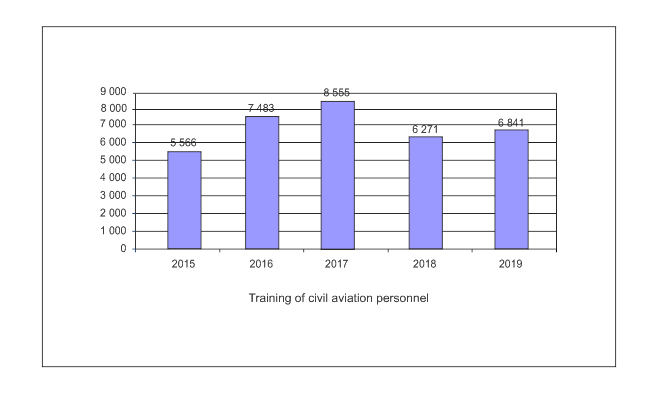Civil Aviation Training
A total of 799 fellowships were awarded under technical cooperation projects (for a combined duration of 688 work-months) of which 625 (78.2%) were awarded to male participants and 174 (21.8%) to female participants, as described below.
Under country and regional technical cooperation projects funded by recipient governments or donors, 254 of these fellowships were awarded to 214 male and 40 female participants;
Under Memoranda of Understanding (MOUs) signed by ICAO with the Republic of Korea, Quatar and Singapore for the provision of training to be funded by these countries and administered by ICAO, 545 fellowships were awarded to 411 male and 134 female participants. Of these:
- 5 fellowships were awarded to five male participants for training undertaken at the Qatar Aeronautical College (QAC) in air traffic control (ATC), aircraft maintenance and pilot training;
- 237 fellowships were awarded to 187 male and 50 female participants for training undertaken at the Korean Civil Aviation Training Centre (KCATC) and the Incheon Airport Aviation Academy (IAAA). Related subject matters included airport lighting operation and management, airport customer service quality management, doppler very high frequency omni-range (DVOR) maintenance, aerodrome inspection, aerodrome communications, navigation and surveillance (CNS) engineering, instrument landing system (ILS) maintenance, aviation security (AVSEC) and safety, airport pavement evaluation, airport construction and operation, safety oversight management, practical preparation for the ICAO Universal Safety Oversight Audit Programme Continuous Monitoring Approach (USOAP-CMA), airport passenger boarding bridge operations, aviation policy for executives and radar approach control; and
- 303 fellowships were awarded to 219 male and 84 female participants for training undertaken at the Singapore Aviation Academy (SAA). Courses and workshops on the following subject matters were provided: operational hazard identification, Strategic Airport Management Programme, air navigation service leadership and management, air traffic flow management and collaborative decision making, air traffic safety electronic personnel, aircraft accident investigation techniques and management, Aviation Crisis Management Programme, Scholarship for Diploma in Civil Aviation Management, Scholarship for Diploma in Aviation Safety Management, safety oversight inspectors (air navigation services), safety oversight inspectors (flight operations), crisis management in aviation security, safety oversight managers, Civil Aviation Management Programme, Aviation Security Management Programme, aviation weather risk management, emergency management, safety oversight of aviation meteorological services, future airports: transforming mindsets of regulators and airport operators for tomorrow, aviation security risk assessment and developing security manuals, future airports: building smart airport capabilities, future airports disruptions, innovations and opportunities, future airports (technology and digital agility for regulators and airport operators), methodology and best practices for aviation system block upgrades implementation, air traffic management safety investigation and analysis, procedures and design process for performance-based navigation (PBN) airspace, safety audits of air traffic services; and airport emergency service command leadership.
ICAO experts recruited through technical cooperation projects provided in-country training in various fields for a total of 385 civil aviation administration personnel out of which 489 (83.4%) were male and 896 (16.6%) were female.
Recipient States also continued to include substantial training for their nationals as part of the procurement component of their ICAO technical cooperation projects. In addition, 657 national staff benefited from training in new technologies and in the operation of equipment purchased through ICAO technical cooperation projects.
The training of management, technical and operational personnel was particularly important in terms of improving State oversight capabilities. According to information provided by Member States, personnel trained through the Technical Cooperation Programme (i.e. aviation safety and security personnel, including inspectors) are progressively absorbed by civil aviation administrations, which greatly benefit from the training and retention of a qualified workforce.

